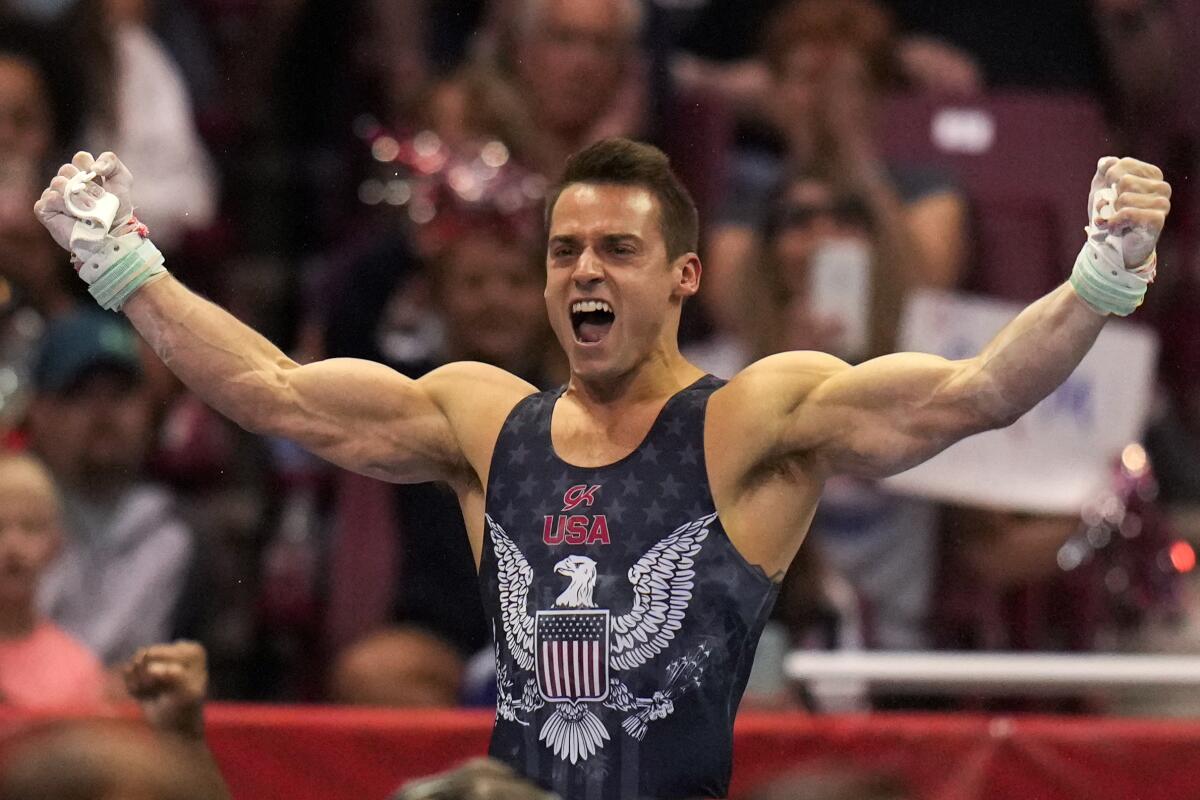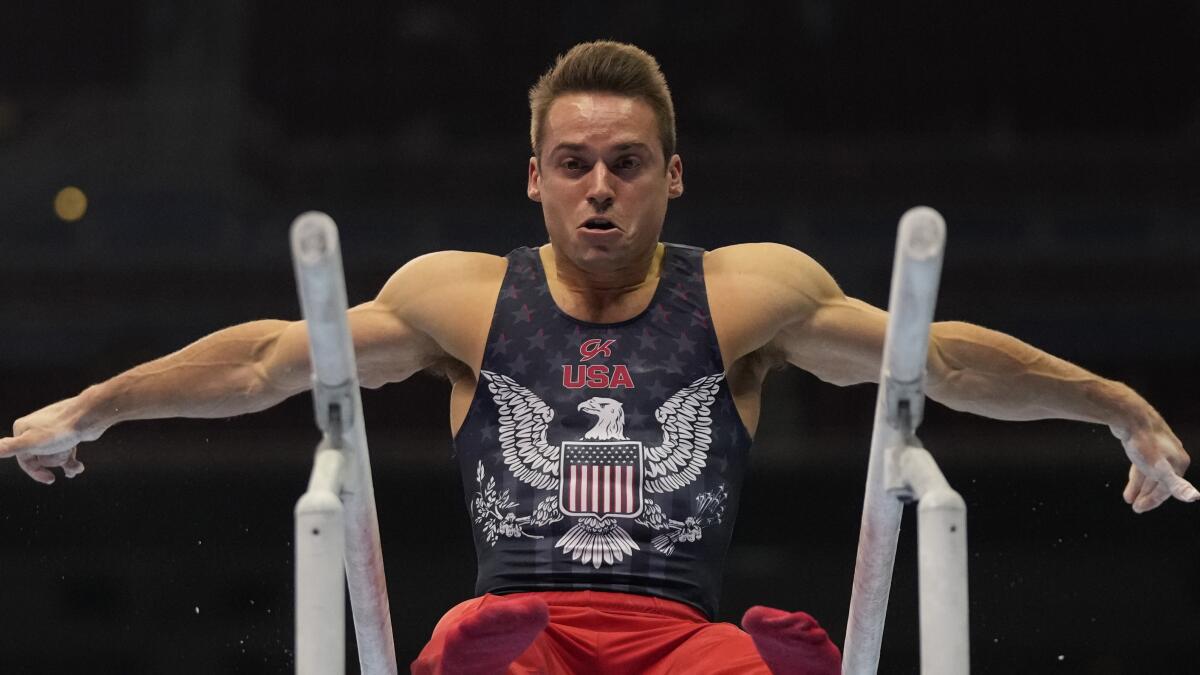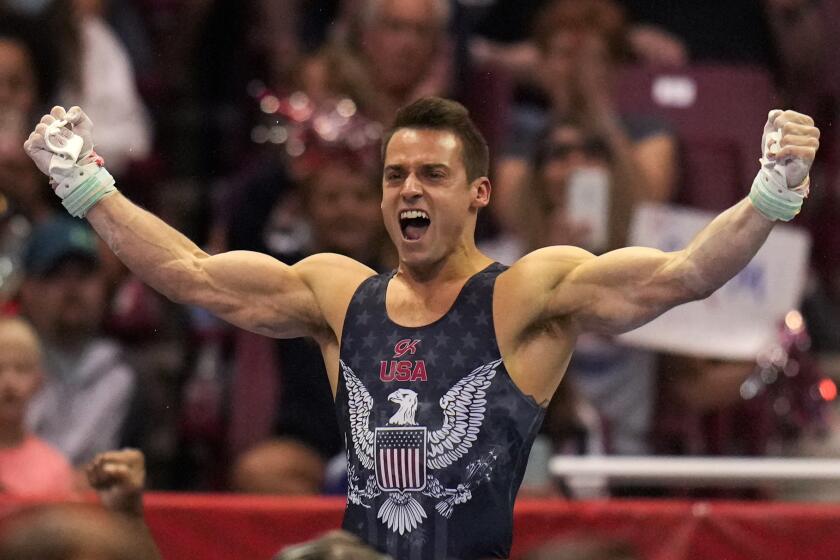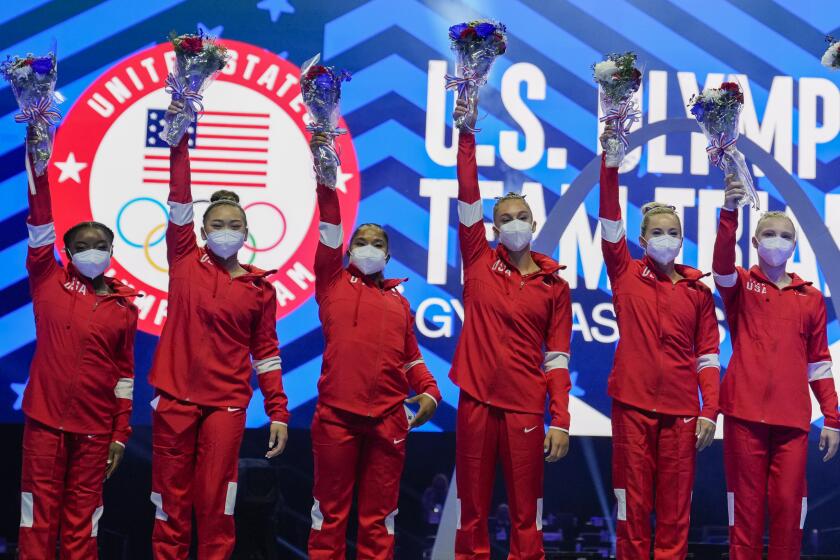Column: Gymnast Sam Mikulak of Newport Coast now knows Olympic journey is real prize

- Share via
It took Sam Mikulak a long time to realize his Olympic journey was its own reward, that he didn’t need a hunk of metal placed around his neck to validate who he is or what he has accomplished in his distinguished gymnastics career.
No longer the young hotshot on the U.S. men’s team, with retirement and marriage to TV personality Mia Atkins on the horizon, the 28-year-old from Newport Coast and Corona del Mar High is approaching his third Olympics with liberating clarity. He hopes to contribute to a team medal for the longshot U.S. men and might make the event finals on the high bar. Above all, the six-time U.S. all-around champion has recognized the chase was the real prize all along.
“I’m giving up a lot on the all-around medal, but at this point, where I’ve come through my whole mental health journey, I’m fine if I don’t get any,” said Mikulak, who competed on fifth-place teams at London in 2012 and Rio in 2016 and finished fourth in the high bar final and seventh in the all-around at Rio. “And I think for so long I’ve resented my past Olympic experiences because I dictated my happiness based on whether or not I would come away with a medal and the fact I didn’t, I, like, hated myself a little bit for that reason.
“Now that I’m where I’m at emotionally and in a better mental health state, I am totally fine if it doesn’t go that way. The only thing I care about is going out there and feeling the support from everyone, taking everything with a positive perception and being myself, not letting anyone else tell me how or the way I should act. The biggest thing is I just want to go and have fun. I want to be smiling the entire time because I don’t think I smiled enough in my past Olympic experiences.”
Sam Mikulak of Newport Beach and Shane Wiskus overcame obstacles to make the U.S. men’s gymnastics team, which will try to revive its fortunes in Tokyo.
Competing at the Olympic trials against younger gymnasts who were sharpened by recent NCAA competition, Mikulak’s Tokyo chances seemed to dip when he slipped off the pommel horse in his final rotation. Brody Malone, who had succeeded Mikulak as the U.S. all-around champion a few weeks earlier, and 24-year-old Yul Moldauer won automatic berths as the 1-2 finishers at the trials, and 22-year-old Shane Wiskus, who trains with Mikulak in Colorado Springs, emphatically earned a spot. Brandon Briones of Stanford had a higher-scoring second-day performance than Mikulak and finished 0.05 of a point behind him in the all-around standings.
“Was that the moment that just blew it for me?” Mikulak recalled thinking after his pommel horse misadventure.
Not to worry. He finished fourth in the all-around event and was named to the four-man team with Malone, Moldauer and Wiskus. Event specialist Alec Yoder also was nominated for the Tokyo squad.
‘The only thing I care about is going out there and feeling the support from everyone, taking everything with a positive perception and being myself.’
— Gymnast Sam Mikulak, on his approach to his third Olympics
Mikulak’s international experience was too valuable to leave home. So are the formidable skills that enabled him to earn the highest combined floor exercise score and second-best high bar score. He struggled with wrist, elbow and calf injuries after the COVID-19 pandemic delayed the Games by a year, but his spirit prevailed.
“At this stage, he’s happy he has a chance for a third Olympics, which very few male gymnasts have ever had. And he has the potential to medal,” said his father, Stephen Mikulak, an orthopedic doctor and a former Cal gymnast.
“I think he’s going in giving it everything he’s got and he’s got nothing left. This is it. He’s just laying it all out there.”
His teammates respect that. As soon as the team was announced, Moldauer declared the team’s mission is to win a medal for Mikulak. “Sam’s the man. He’s been through many years of gymnastics, and he’s helped all of us. It’s important for us to have that goal, to get Sam some hardware,” Moldauer said.
“It’s kind of like just a saying to get us motivated more, but we all want to podium and have that taste for Sam before he retires. That’s important to us because he’s had a huge role on the national team. I remember when I was younger, I looked at Sam as a role model, and to finally be able to compete side by side with him, it’s special. So, the least that we can do is train our butts off, perform well and get Sam that medal around his neck before he leaves the sport.”

Mikulak has been open about relying on mental health professionals to navigate the pressures and perils of a sport in which one wobble or shaky landing can negate years of hard work. If his teammates ask, he said, he’d advise them to reach out for help. He benefited from working with a therapist and sports psychologist during the pandemic-driven shutdown, and he began keeping a journal that allowed him to speak his truths.
“I started getting all these things off my chest that I never knew for so many years were in there. Anytime I’d feel them pop up, I’d squish them down or I’d ignore [them]. I’d go left instead of going right. It took a very long time for me to be emotional, get to share my feelings,” he said. “I never thought it was a foreign concept. I always just lied to myself to get over those feelings.”
Simone Biles, Sunisa Lee, Jordan Chiles and Grace McCallum will make up the U.S. Olympic women’s gymnastics team in Tokyo next month.
His father can sense the difference. “He has prepared as well as anybody can possibly prepare physically for the competition, and psychologically, this extra year, he’s really done a lot of mental work and he’s in a very good place inside his own head as well,” Stephen Mikulak said. “It will be really interesting to see. As long as his body holds out, I think he has his best chance ever to walk home with a medal.”
Olympic organizers have banned foreign spectators from Japan, so Stephen Mikulak will root for his son from home. He won’t be sitting still. “When I’m watching a routine, I’ll definitely be going through the motions and trying to make sure he does the right stuff,” the elder Mikulak said. “It’s funny. It just naturally comes because you’re just used to doing it, not watching it. You just start swinging back and forth.”
Whatever the outcome, Sam won’t need a panel of judges to know his was a career well done.
More to Read
Go beyond the scoreboard
Get the latest on L.A.'s teams in the daily Sports Report newsletter.
You may occasionally receive promotional content from the Los Angeles Times.









